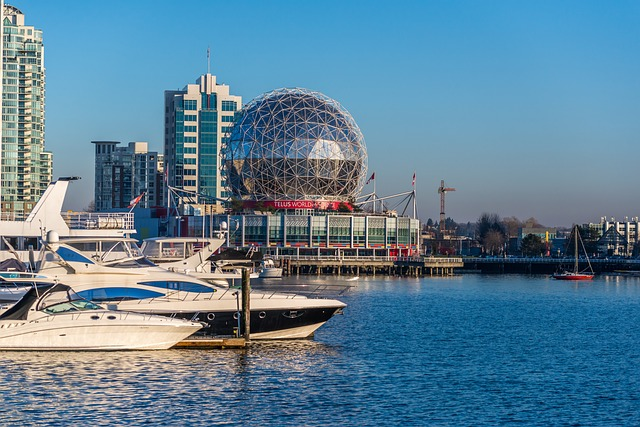How Small Businesses Can Help Bring Economic Growth to Vancouver
A few years ago, I stood up at a business networking event and criticized the business owners there for describing their operation as a ‘small business.’ Why? I had noticed with growing frustration how business owners were content with the label ‘small business’ as if that excuses their successes and failures.
What is a Small business?

In Canada, a small business has:
- Between 1-99 employees
- Employs 70% of the population, that’s 78% of all private jobs or 7.7 million adults (as of 2012)
- Produces 30% of GDP
Your so-called ‘small business’ pays the mortgage or rent of all your employees, puts food on their tables and supports the local community where your business is located.
As the owner, you work on average 50 hours per week compared to 37 for most employees!
Private-owned and operated, they have limited resources and may specialize in a certain product or service.
When small businesses thrive, they bring economic growth to their local area by providing jobs, boosting consumer spending in their locality, and creating a vibrant entrepreneurial spirit.
Benefits of Supporting Local Small Businesses in Vancouver
Supporting local small businesses in Vancouver is essential for creating a thriving and successful local economy. These local small businesses are the backbone of the community, contributing to job growth and providing essential goods and services to locals. Moreover, when you shop locally, you’re helping to positively impact the community by keeping money within it that would otherwise be spent at larger, more distant companies. Additionally, local spending can help decrease poverty levels in underserved communities and contribute to better infrastructure. Lastly, supporting small businesses helps create a sense of community pride, as residents can support local entrepreneurs who are passionate about their work and invested in the city’s future.

Small businesses are essential to the Vancouver economy, and we should all do our part in supporting them. Local small businesses help create a sense of pride in their communities and contribute to job growth, economic prosperity, and infrastructure development. When you shop locally, you can positively impact your community by keeping money within it that would otherwise be spent elsewhere. Let’s all do our part to support small businesses and the communities they serve!
Strategies for Growing Your Small Business in Vancouver
Knowing where to start when financing and growing your small business, whether in Vancouver or elsewhere, can take a lot of work. Fortunately, a few strategies and tips exist for financing and increasing your small business’s chances of success.
First, it’s important to ensure you have the necessary licenses, insurance and permits to operate legally as a food business in Vancouver. Once that is resolved, start by doing market research and researching potential customer segments and markets. Use this information there to create a simple business plan and marketing strategy. Additionally, explore potential partnerships with local businesses and organizations to increase visibility and sales.

Strategies for Growing Your Small Business in Vancouver include:
- Leveraging Technology: Utilize technology to streamline operations, automate processes, reduce overhead costs, and enhance customer service.
- Networking and Collaborating: Connect with local small businesses and organizations to create strategic partnerships resulting in shared resources and increased visibility.
- Investing in Training & Education: Enroll your employees or yourself in classes or seminars offering specific industry knowledge and skills to help you reach new heights of success.
- Creating an Online Presence: Develop an online presence through social media platforms like Facebook, Twitter, and Instagram to increase brand awareness and engage your customers.
- Creating a Differentiated Product/Service Offering: Identity what sets your business apart from its competitors by creating a unique product or service offering to appeal to a broader audience.
- Advertising & Promotion: Invest in targeted advertising campaigns on different channels such as radio, TV, print publications, and the internet that appeal to your target market’s needs and interests.
Tips for Choosing the Perfect Location for your Small Business in Vancouver
Choosing the perfect location for your small business in Vancouver is an important decision that can have a major impact on the success of your enterprise. Finding a spot that meets your practical needs and aesthetic preferences while considering the surrounding area’s demographics is essential.

Here are some tips to help you choose the right location for your small business in Vancouver:
Think about accessibility:
When selecting a location for your small business, it’s important to consider how accessible it will be to customers and clients. Will there be easy access to public transport? Are there parking spaces reserved nearby?
Consider foot traffic:
Having a good flow of pedestrians is beneficial when running a local shop or retail store; however, if you plan on running an office-based business, consider quieter areas to avoid disrupting staff workflow with excessive noise.
Analyze the competition:
Researching any other businesses located nearby can give you an idea of what kind of market exists in that area and may help you decide whether or not it’s suitable for your business plan to set up shop near them. If multiple similar businesses are already operating nearby, then it may be wise to look elsewhere.
Look at rental costs:
These vary according to location and type of property, so it’s important to research how much rent could be expected in various areas before committing to any decisions. Setting up shop somewhere with higher rent prices may also mean reaching out to more affluent customers; however, lower rates could mean saving money on overhead costs, which can go towards developing other aspects of your company, such as marketing or product development.
Assess amenities:
High-quality amenities and services like public parks and green spaces can make your commercial space in an area more attractive while providing your customers with pleasant surroundings they want to return to again and again. Furthermore, having convenient services such as banks, post offices, and shops nearby can prove useful when conducting business operations or regularly using these services.
By following these tips for choosing the perfect location for your small business in Vancouver, you’ll ensure you have all the necessary elements for success from day one!
Common Challenges Faced By Small Business Owners in Vancouver include:
Finding the Right Talent:
Competition for qualified personnel can be intense, and finding the right people to round out and support your team is essential for success. To overcome this challenge, consider creating internships or part-time positions that allow individuals to gain practical experience while testing an organization’s culture and mission.
Cash Flow Management:
Managing cash flow is a common challenge small businesses face due to limited resources and tight profit margins. Review expenses regularly and find ways to reduce costs to maintain a strong cash flow. Additionally, consider applying for business loans or lines of credit if needed.
Lack of Capital:
Securing capital can be difficult for small businesses as lenders are often reluctant to finance startups and other small businesses due to their lower creditworthiness or lack of collateral. To overcome this challenge, consider applying for grants or financing from private investors or crowdfunding platforms. Additionally, seek out grants and special programs from government or private foundations.
Accessing Credit:
New and even established companies may find it difficult to access business loans in the current economy to expand their operations. Research potential lenders to determine their requirements and prepare a well-thought-out business plan and cash flow forecast to increase the chances of getting approved for a loan.
Regulatory Compliance:
Staying on top of local, state, and federal regulations can be time-consuming, requiring ongoing monitoring and updating of policies and procedures. To overcome this challenge, seek qualified legal professionals to help you stay compliant and educate yourself on the principal requirements for your business.
Issues with Suppliers
Dependence on suppliers can lead to disruptions throughout the supply chain if they fail to meet deadlines or specification criteria, resulting in delays or production issues that can disrupt business operations and result in lost revenue. To reduce the risk of issues with suppliers, consider diversifying your supplier base to ensure that you have multiple sources in case of unforeseen circumstances.
Networking Opportunities for Entrepreneurs & Small Business Owners In Vancouver

Vancouver is a thriving city for entrepreneurs and small business owners, offering full support and networking opportunities for individuals looking to expand their businesses. Many organizations, such as the British Columbia Entrepreneur Network (BCEN) and the Technology Innovation Council (TIC), host regular meetups and events so entrepreneurs and small business owners can connect and gain insights and expertise from experienced professionals. In addition, numerous local Chambers of Commerce in Vancouver can provide invaluable support and networking resources through workshops, seminars, and other educational sessions.
Social media has become an essential tool for networking in Vancouver. Business owners should create accounts on platforms like Facebook, Twitter, LinkedIn and Instagram to increase visibility and reach potential customers or partners. Additionally, these sites are great places to post job openings, tips or upcoming events related to your business and provide updates and tips about products or services you may offer.
Networking doesn’t only have to take place online; it’s also important to establish relationships by attending industry events or conferences related to your business sector. These events provide great opportunities to meet new people and gain valuable insight into how others operate their businesses in Vancouver. Moreover, it’s important to stay connected after the event ends by staying in touch with those you’ve met or exchanging contact information so you can build long-lasting relationships that could help further your business goals in the future.
Vancouver also offers plenty of opportunities for entrepreneurs and small business owners who want to network with each other outside of organized events or meetings by getting involved in local initiatives such as volunteering at a charity event or sponsoring a community project. This is a great way to give back while exposing you to new contacts that may benefit your business growth. It’s also a good idea to join online forums dedicated to small businesses where members can help one another grow their enterprises through advice sharing and collaboration opportunities.
With Vancouver’s strong entrepreneurial spirit and supportive small business community, there are plenty of ways for entrepreneurs and small business owners to network. Whether attending a BCEN event or getting involved in a local initiative, establishing relationships with other business owners can be extremely beneficial for the growth of your business. Making the most of all the networking opportunities in Vancouver will help you build connections with potential customers and provide valuable insight into how others successfully operate their small businesses in BC.
Creating a Sustainable Environment for Small Businesses Through Investment In Vancouver
Investing in small businesses is crucial for cities like Vancouver to support its economic growth and for creating a sustainable environment of support for small business owners.

With rising unemployment rates due to the pandemic, small business owners face more challenges than ever in keeping their businesses afloat. To keep them afloat, cities like Vancouver must invest in initiatives supporting small businesses in BC, local economies and providing entrepreneurs with resources.
One way this can be achieved in the current economy is through government incentives such as tax credits, grants, or loans that can help small businesses cover the cost of operations, hire employees, or access new markets and customers. Such investments serve as a lifeline to these businesses and can significantly impact their survival rate over time. By providing financial assistance, small businesses can remain competitive in the current economy and continue to create jobs within their communities.
Additionally, it’s important to focus on financial investments and educational resources essential for entrepreneurs needing access to formal training opportunities. Organizations like Vancouver Community Futures offer a variety of programs designed to help business owners develop the necessary skills needed to grow their enterprises sustainably. These include workshops on marketing strategy, financial literacy, management training and more. Small business owners should use these resources to ensure success over time.
Some cities are also investing in infrastructure projects such as public transit upgrades or broadband improvements, making it easier for people with limited resources to conduct business operations remotely from anywhere in the city. This helps eliminate transportation costs while increasing employee productivity which has been proven beneficial for the growth of local economies worldwide.
Small business owners often need access to formal training opportunities that can provide them with the necessary knowledge and skills for success. This is why providing educational resources like workshops, seminars, or classes is so important for helping these entrepreneurs reach their goals. For example, attending these events can allow business owners to network with industry professionals and find mentorship opportunities they might not find in more traditional learning environments.
Not only can such resources offer practical advice on various topics related to running a business, but they also have the potential to open new doors in terms of partnerships, collaborations and sales opportunities. Additionally, attending such events allows small business owners to improve their skills while learning from others’ experiences. By attending regular workshops and seminars on topics ranging from marketing to finance, small businesses can gain valuable insights which could prove invaluable for long-term success.
To better support local entrepreneurs, municipalities should invest in creating training programs designed specifically for small business owners and providing grants for those wishing to attend professional development events geared towards their industries. This will create a platform for startups, expand existing businesses’ operations, and contribute significantly towards stimulating economic growth within their communities.
In summary, investment is integral to the current economy and creating a sustainable environment for small business owners in Vancouver and beyond. From introducing tax credits and grants to providing educational resources and investing in infrastructure projects – these investments make it possible for entrepreneurs and local businesses to survive and thrive within their communities long-term.
In conclusion
Supporting small businesses in Vancouver is essential for the city’s prosperity. Providing access to capital, educational resources, infrastructure investments and tax breaks are all key measures that can help create an environment that enables entrepreneurs to thrive. By considering these topics, cities like Vancouver can ensure a sustainable future for local enterprises, positively impacting the economy, job market, and living standards for residents alike. Taking steps to support small businesses is not only cost-effective but also beneficial for the long-term growth of the entire city.



